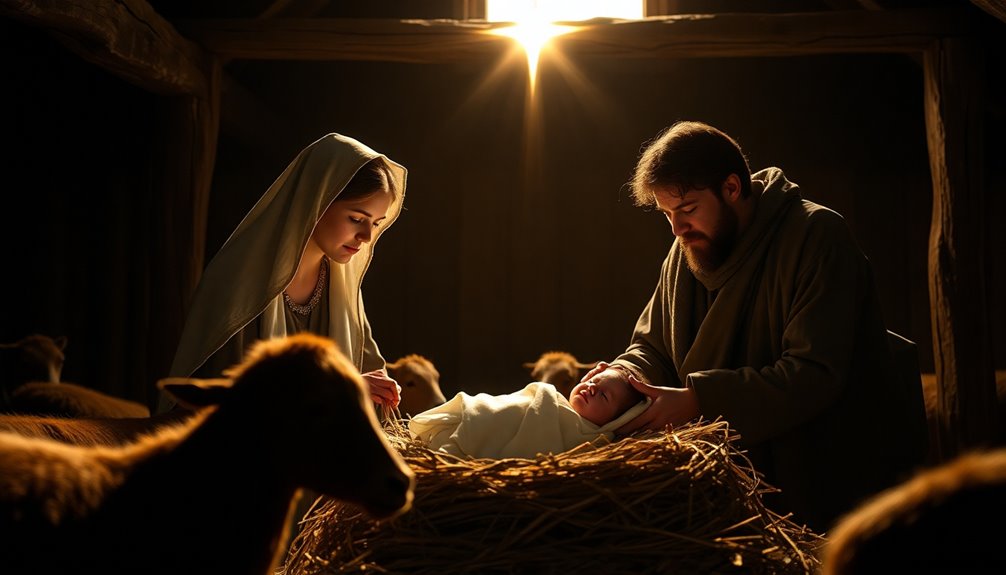The First Christmas marks the miraculous birth of Jesus Christ in Bethlehem. Celebrated on December 25, this event symbolizes hope and joy for millions worldwide. Jesus was born during King Herod's reign, and Mary and Joseph faced humble circumstances, laying him in a manger. Angels announced his arrival, and shepherds came to witness the joy. Wise men, guided by a star, brought gifts recognizing his royal status. Discover more about this cherished tradition and its significance.
The First Christmas marks a pivotal moment in history—the birth of Jesus Christ, celebrated every December 25. While the Bible doesn't specify this date, it's become a cherished tradition for millions around the world. Jesus was born in Bethlehem during the reign of King Herod, and the narratives found in the Gospels of Matthew and Luke provide intriguing insights into this holy event.
In the Nativity story, you encounter significant figures like Mary and Joseph. They faced humble circumstances, with Jesus being laid in a manger due to a lack of lodging. This detail emphasizes the modest beginnings of the one who'd change the world.
Imagine the scene: a quiet night filled with the sounds of animals, the soft glow of a star guiding the way, and the profound significance of the angels announcing the Savior's arrival. Their message of joy and peace resonates through time, reminding you of the hope that accompanies this miraculous birth.
As the story unfolds, you also meet the shepherds who, alerted by the angels, hurried to witness this extraordinary moment. Their journey to see the newborn Jesus symbolizes how the humble and ordinary can encounter the divine. The angels' proclamation of "good news of great joy" invites everyone to share in the wonder of Christmas.
But the Nativity doesn't end there. The arrival of the Magi adds another layer of depth to the story. These wise men traveled from afar, guided by a star to find the newborn king.
When they arrived in Bethlehem, they brought gifts of gold, frankincense, and myrrh—each gift carrying its own significance, representing Jesus' royal status and future sacrifice. Their visit signifies recognition of Jesus as the awaited Messiah, bridging the gap between the humble birth and the profound impact he'd have on humanity.
Today, the Church of the Nativity stands in Bethlehem, marking the traditional site of Jesus' birth. Built by St. Helena, it has become a significant pilgrimage destination for Christians, drawing countless visitors eager to connect with the history and spirituality of that first Christmas.
As you reflect on this pivotal moment, remember the joy, hope, and love that the birth of Jesus brings to the world, a timeless message that continues to resonate in your heart every December.
Frequently Asked Questions
Was the First Christmas When Jesus Was Born?
The first Christmas, as it's known today, didn't actually celebrate Jesus' birth initially. Early Christians focused more on his teachings and resurrection.
It wasn't until the mid-fourth century that December 25 became recognized as the date for celebrating Christmas. This choice was likely influenced by existing pagan festivals.
You might find it interesting that some traditions originally celebrated January 6 as Jesus' birth, showing the evolving nature of this important holiday.
Why Was Christmas Changed From Jan 6 to Dec. 25?
Christmas was changed from January 6 to December 25 mainly to align with pagan mid-winter celebrations.
As early Christians sought to establish a distinct identity, they adopted December 25, creating a festive atmosphere that resonated with the season.
Additionally, this date was formally recognized in a mid-fourth-century Roman almanac, allowing the Western Church to solidify its celebration of Jesus' birth, while the Eastern Church eventually followed suit.
What Is the Real Story of Christmas Day?
Christmas captivates with its charming combination of cheer and celebration.
You've likely heard stories of goodwill, gathering, and giving, all wrapped in the warmth of winter. The real story of Christmas Day, however, lies in its evolution from early Christian observance to a day marked by joy and festivity.
Although the exact origins are debated, December 25 became a date of significance, blending ancient traditions with modern merriment you enjoy each year.
What Happened on 25 December in the Bible?
On December 25, the Bible doesn't specifically mention any events.
However, it later became recognized as the date for celebrating Jesus' birth. Early Christians didn't initially focus on this day, emphasizing Jesus' life and teachings instead.
By the mid-fourth century, as interest in his birth grew, December 25 was adopted, possibly to align with existing pagan festivals.
Conclusion
As you reflect on the first Christmas, consider that over 2 billion people worldwide celebrate this event today, making it one of the most significant holidays in history. This statistic highlights the enduring impact of Jesus' birth, transcending cultures and generations. It's a reminder of the hope and joy that this occasion brings to millions. So, as you gather with loved ones, you're part of a global tradition that continues to inspire and unite people everywhere.










